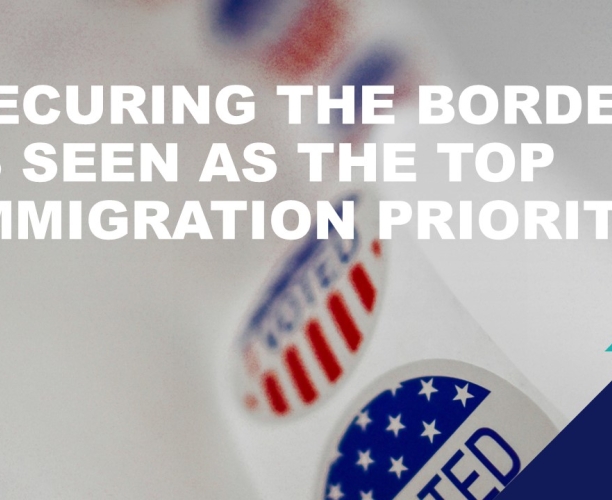

Securing the border is seen as the top immigration priority
Washington, DC, September 18, 2024—A new Scripps News/Ipsos poll finds that a plurality of Americans and Arizona residents* believe securing the U.S.-Mexico border is the top immigration priority for the country. More believe former President Donald Trump would do a better job handling immigration than Vice President Kamala Harris, and Americans broadly do not understand what Harris’ role is, related to immigration. On immigration policy, most support giving a pathway to citizenship for undocumented immigrants who arrived in the U.S. as children, while at the same time mass deportations receive majority support. Driving those differing views are major partisan divides on how to handle immigration in this country.
*Note: The survey is among U.S. adults 18+ and contained an oversample of an extra n=300 Arizona residents in order to analyze findings within that state separately.
Detailed findings:
1. Immigration is a top issue for both Americans and Arizona residents and securing the U.S.-Mexico border is seen as the top priority.
- Thirty-nine percent of Americans and 47% of Arizona residents say immigration is one of the most important issues facing the country. For both groups, only inflation ranks as a higher issue.
- Among all Americans, Republicans (65%) are more likely than Democrats (17%) to cite immigration as a top issue.
- Around three in five Americans (59%) and Arizona residents (62%) are closely following news around the immigration situation at the U.S.-Mexico border.
- When asked what the country’s top priority on immigration is, a plurality of Americans (33%) and Arizona residents (36%) say securing the U.S.-Mexico border. This is followed by:
- Offering a path to citizenship for undocumented immigrants currently living in the U.S. (20% each)
- Deporting those who are in the country illegally (18% of Americans, 14% of Arizona residents)
- Ensuring opportunities remain for those who wish to enter the U.S. legally (18% of Americans, 16% of Arizona residents)
- Providing asylum to those who qualify (6% of Americans, 4% of Arizona residents)
- Taken altogether, 51% of Americans favor restrictions or deportations, and 43% favor reforms that allow for greater opportunities to remain in the U.S.
- Republicans are more likely to view securing the border and deporting those in the country illegally as the top priority, while Democrats are more likely to say the same of offering a path to citizenship for undocumented immigrants, ensuring opportunities for those who want to enter the U.S. legally, and providing asylum to those who qualify.
2. A majority support both restrictions (i.e., mass deportation, allowing law enforcement to detail migrants, restrictions on claiming asylum) and expanded policies (i.e., pathways to citizenship). Under the surface are extremely partisan divides driving these attitudes.
- Around seven in ten Americans (69%) and Arizona residents (70%) support restrictions that limit the number of migrants who can claim asylum. Fewer, but still a majority, support giving local law enforcement the ability to detain migrants (62% and 58%, respectively).
- Splits along party lines exist, as Republicans are more likely than Democrats to support these proposals.
- In the same vein, 58% percent of Arizona residents would support a law that makes unauthorized U.S.-Mexico border entry a state level crime.
- Sentiment is more split when it comes to the mass deportation of undocumented immigrants. Around half of Americans (54%) and Arizona residents (49%) support this.
- However, a strong majority also show support for giving a pathway to citizenship for undocumented immigrants who arrived in the U.S. as children (68% of Americans, 72% of Arizona residents). A majority regardless of partisanship show support.
3. Trump is seen as better on immigration, as there is no general agreement about what Harris’ current responsibilities as Vice President are, related to immigration.
- Forty-four percent of Americans believe Trump will do a better job handling immigration, compared to 34% that say Harris.
- Arizona residents also view Trump as the better candidate on immigration (41% vs 28%), although 21% don’t believe either candidate will handle immigration well.
- There is no consensus among Americans about what Harris’ responsibilities are as Vice President related to immigration:
- 10% believe she is responsible for addressing the reasons why migrants leave their home countries for the U.S.
- 17% believe she is responsible for securing the southern border
- 28% say a mix of both
- 24% believe she has little to no responsibility
- 20% don’t know
About the Study
This Scripps News/Ipsos poll was conducted by Ipsos from September 13 to September 15, 2024, using the probability-based KnowledgePanel®. This poll is based on a nationally representative probability sample of 1,027 adults age 18 or older. The sample includes 401 respondents that are currently residents of Arizona.
The survey was conducted using KnowledgePanel, the most well-established online probability-based panel that is representative of the adult US population. Our recruitment process employs a scientifically developed addressed-based sampling methodology using the latest Delivery Sequence File of the USPS – a database with full coverage of all delivery points in the US. Households invited to join the panel are randomly selected from all available households in the U.S. Persons in the sampled households are invited to join and participate in the panel. Those selected who do not already have internet access are provided a tablet and internet connection at no cost to the panel member. Those who join the panel and who are selected to participate in a survey are sent a unique password-protected log-in used to complete surveys online. As a result of our recruitment and sampling methodologies, samples from KnowledgePanel cover all households regardless of their phone or internet status and findings can be reported with a margin of sampling error and projected to the general population. KnowledgePanel members receive a per survey incentive, usually the equivalent of $1 (though for some it is $2) in points, that can be redeemed for cash or prizes. A prenotification email was sent prior to field. Panelists receive a unique login to the survey and are only able to complete it one time. No email reminders were sent.
The study was conducted in English. The data for the national gen pop sample were weighted to adjust for gender by age, race/ethnicity, education, Census region, metropolitan status, household income, and party ID. Party ID benchmarks are from the 2024 NPORS annual survey. The demographic benchmarks came from the 2023 March Supplement of the Current Population Survey (CPS).
- Gender (Male, Female) by Age (18–29, 30–44, 45-59 and 60+)
- Race/Hispanic Ethnicity (White Non-Hispanic, Black Non-Hispanic, Other, Non-Hispanic, Hispanic, 2+ Races, Non-Hispanic)
- Education (Less than High School, High School, Some College, Bachelor or higher)
- Census Region (Northeast, Midwest, South, West)
- Metropolitan status (Metro, non-Metro)
- Household Income (Under $25,000, $25,000-$49,999, $50,000-$74,999, $75,000-$99,999, $100,000-$149,999, $150,000+)
- Party ID (Democrat, Lean Democrat, Republican, Lean Republican, Independent/Something else)
The data for the Arizona gen pop sample were weighted to adjust for gender by age, race/ethnicity, education, metropolitan status, household income, and 2020 vote choice. The demographic benchmarks came from the 2022 American Community Survey (ACS).
- Gender (Male, Female) by Age (18–44, 45–59, 60+)
- Race/Hispanic Ethnicity (White Non-Hispanic, Hispanic, Non-White, Non-Hispanic)
- Education (High School or less, Some College, Bachelor or higher)
- Metropolitan status (Metro, non-Metro)
- Household Income (Under $50,000, $50,000-$99,999, $100,000+)
- 2020 Presidential Vote Choice (Joe Biden, Donald Trump, Someone else/Did not vote)
The margin of sampling error is plus or minus 3.6 percentage points at the 95% confidence level, for results based on the national gen pop sample. The margin of sampling error takes into account the design effect, which was 1.42. For the Arizona gen pop sample, the margin of sampling error is plus or minus 7.1 percentage points, and the design effect is 2.10.
The margin of sampling error is higher and varies for results based on sub-samples. In our reporting of the findings, percentage points are rounded off to the nearest whole number. As a result, percentages in a given table column may total slightly higher or lower than 100%. In questions that permit multiple responses, columns may total substantially more than 100%, depending on the number of different responses offered by each respondent.
For more information on this news release, please contact:
Mallory Newall
Vice President, US
Public Affairs
+1 202 374-2613
[email protected]
About Ipsos
Ipsos is one of the largest market research and polling companies globally, operating in 90 markets and employing over 18,000 people.
Our passionately curious research professionals, analysts and scientists have built unique multi-specialist capabilities that provide true understanding and powerful insights into the actions, opinions and motivations of citizens, consumers, patients, customers or employees. Our 75 solutions are based on primary data from our surveys, social media monitoring, and qualitative or observational techniques.
Our tagline "Game Changers" sums up our ambition to help our 5,000 customers move confidently through a rapidly changing world.
Founded in France in 1975, Ipsos has been listed on the Euronext Paris since July 1, 1999. The company is part of the SBF 120 and Mid-60 indices and is eligible for the Deferred Settlement Service (SRD). ISIN code FR0000073298, Reuters ISOS.PA, Bloomberg IPS:FP www.ipsos.com



